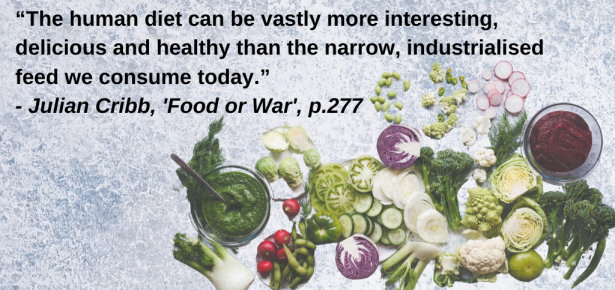
Humans have yet to explore Planet Earth in terms of what it can offer that is good to eat.
“Food can give full rein to humanity’s imagination, dreams and ideas. It can prevent war and secure our future in the time of our greatest peril.”
That’s one of the shocking facts in Food or War, a powerful new book on the future of food.
The present industrial food system includes fewer than 1 per cent of all the edible plants on the planet. The unbelievable narrowness of the modern industrial diet is a stark illustration of how poor it is, not only in diversity but also in healthiness and sustainability.
Nowadays, more than two thirds of humans die by their own hand – the hand holding the fork or chopsticks – from a diet-related disease. Our bad diet is a cause of most of the incurable diseases that are clogging up healthcare systems around the world.
In Food or War, I foreshadow a global food revolution that will transform not only what we eat – but also the future of civilization. A revolution that will feed everyone, reduce the risk of war, help end the Sixth Extinction, overcome climate risk in the food supply – and provide us all with a far more interesting, tasty, healthy and sustainable diet.
A long-running study by Australian agronomist Dr Bruce French has compiled a worldwide list of edible plants that already contains 30,500 entries. Compare this with the 200 plants that form the staples of your ‘supermarket diet’ and you can see how much we are missing – and how impoverished is the present global food system.
Many of these unknown food plants will become staples of the future, sustainable world diet, along with sea plants and many other currently neglected foods. Many of these plants are already well known to indigenous peoples around the world – but the knowledge is fragile and may soon be lost, as too may many of plant species now being eradicated by land clearing, wildfires and climate change.
In Australia, for example, there are over 6,100 edible plants known to Aboriginal people, of which only four or five appear in the present Australian diet, and only one in the world diet.
A vast culinary and farming opportunity and adventure awaits us as part of the three-part global food revolution described in Food or War: regenerative farming, urban food production and ocean aquaculture.
In my view, Dr French should be cast in bronze by the World Chefs’ Association for identifying tens of thousands of novel ingredients their members, the best chefs on the planet, had never even heard of.
“Thanks to an observant eye and a flash of insight, Bruce French has reshaped the human culinary destiny, the future of food and of farming.”
Just as the 1970s were the age of rock ’n roll, and the 1990s the era of the internet, we are now entering the Age of Food. Never has world cuisine been so spectacularly diverse – or so far short of its true potential.
Never have the opportunities offered by food been so many or so great – to restore the planet and its climate, to end the Sixth Extinction, to bring peace and plenty to all lands and societies, and to give rise to novel technologies and rewarding and useful employment and self-employment in megacities, on farms, in the oceans and in the world’s rewilded lands.
Food can give full rein to humanity’s imagination, dreams and ideas. It can prevent war and secure our future in the time of our greatest peril.
Food is one of the most creative acts which we humans perform. How well we do it will shape and define the future of our civilisation.
Latest Comments
Have your say!